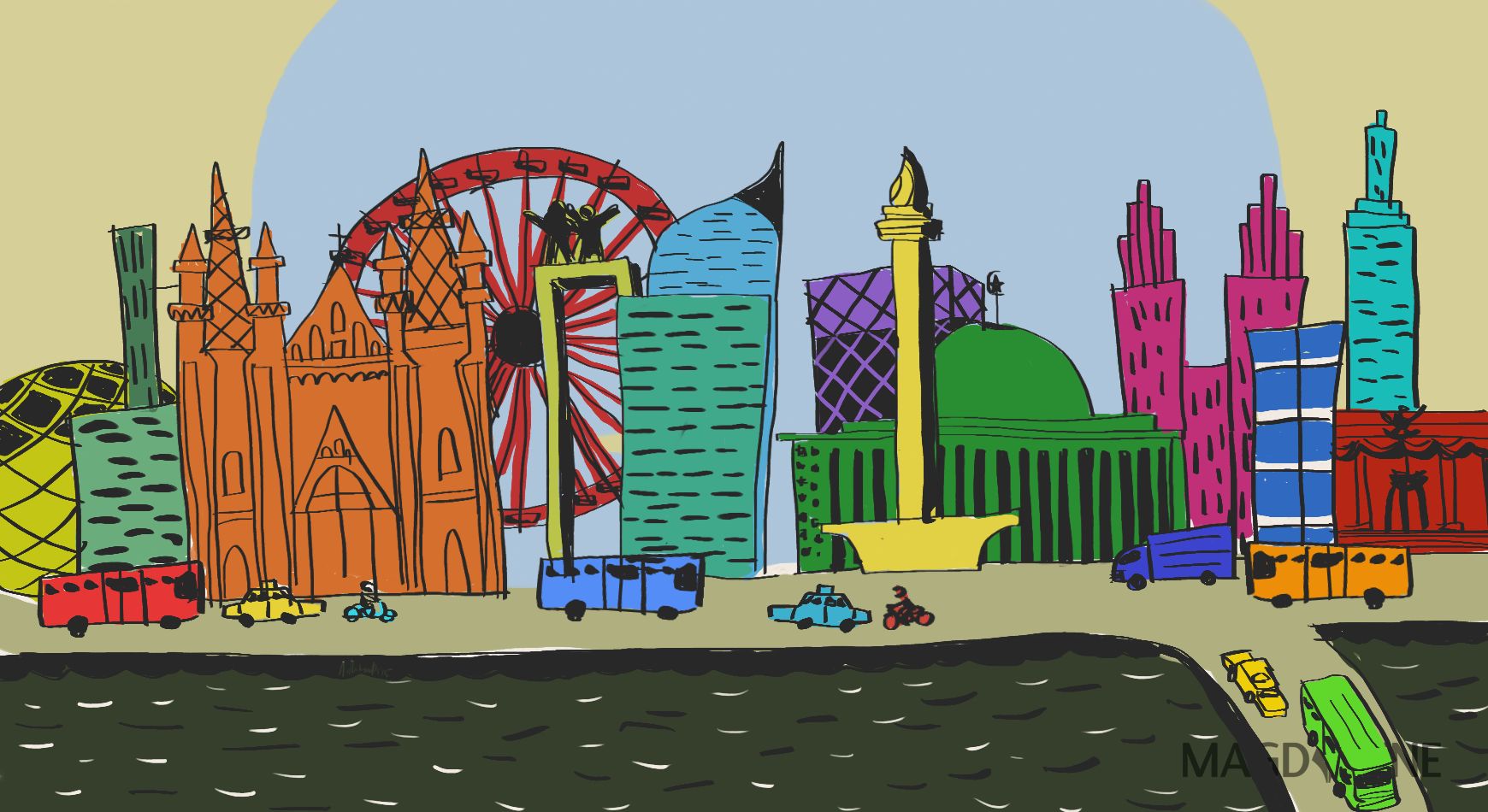Who owns our city?
Whether it’s a sprawling megalopolis or a more compact and heterogeneous municipality, does everyone have the same rights and opportunities, or does the city belong only to a few?
These are the questions at the center of a discussion held to open the 5th Urban Social Forum last week (Dec. 16) in Bandung, West Java. Hosted by Kota Kita organization, the annual forum aims to spread awareness about problems happening in Indonesian cities as well as support ideas and initiatives for urban development. Previously held in Solo, Surabaya, and Semarang, this year the forum took place in SMA Negeri 3 Bandung, presenting 23 parallel panels and workshops. It also exhibits many booths from organizations and communities.
“The Urban Social Forum offers an open and inclusive space where activists and citizens can learn from each other, discuss and exchange ideas, as well as develop collaborations that can lead to initiatives and impact for more inclusive and humane cities,” said Co-founder and director of Kota Kita, Ahmad Rifai, who moderated the opening panel discussion.
In answering the question of who owns the city, environmental activist Gugun Muhammad cited the example of Jakarta, where a total of 35,000 hectares of land – “half of Jakarta,” he claims – is owned by private developers.
And then there is the problem of zoning in city planning that fails to take into consideration the urban poor with much of the area that should be used for housing being allocated for businesses. Cities are practically controlled by private sector, leaving the poor to fend for themselves, he said.
“We often hear about ‘land crisis’, as if we’re running out of space to live in, but that’s not actually the case. The problem is not that we’ve run out of land, it is that there is a huge gap in land ownership.”
At the same time, the government and the media continue to perpetuate the perception that urban kampongs or slums are a bad and unlivable place.
“Slums are always seen as a deplorable part of the city. They’re filthy and are dens of criminals. Government officials and the media have played a key part in defining what slums are, stigmatizing low-income people,” Gugun explained.
Prescribed solutions to improve the “standard of living” often reflect this, imposing the same standards of living and behavior of those more well off to slum residents. For example, a house that is suitable to live in is determined to be at least 6 by 6 square meters, so anything smaller is considered unsuitable for living. This reflects a class bias. A house to middle class and well-off residents serve different functions than to low income residents, he said.
“People of higher income conduct a lot of their activities inside their homes, but poor people are mostly outside the whole day except when they sleep. They work outside, eat outside, socialize outside, and even use communal toilets,” he added.
Also speaking at the panel discussion was Managing Editor of Magdalene Hera Diani, who highlighted the gender aspect of urban living. Bandung-born Hera talked about her school days, when she attended the SMA Negeri 5 high school, which is located right next to the venue. One of the bad memories she had from those days was the daily sexual harassment experienced by female students like her when commuting.
“I remember there was a man near school who used to flash his penis at us girls. We would scream, but he kept doing that anyway day after day,” she said.
She continued: “We would also experience being catcalled and even physically harassed. When an angkot (public minivan) was full, the conductor would usually stand at the door with one hand holding on to van. Well, when the van drove past us school girls on the street, the conductor would use his free hand to grab our boobs,” she said.
Unfortunately, little has changed since then, Hera said. Sexual harassment on the street is still a daily phenomenon experienced by most women today and public space is still not a safe place for women.
She offered some explanations to the problem: “Our social norms still objectify women, our public transport facilities are not proper enough, and many pedestrian sidewalks are inadequate. But we also still lack a reporting system for when sexual harassment happens. The authorities are still ignorant of this issue, so they would do nothing because sexual harassment is considered normal,” she added.
In addition, the existing infrastructures do not make it easy for women to live, especially those with special needs. She pointed at extremely steep stair cases on pedestrian bridges or TransJakarta bus stops that make it really tough for pregnant women who use public transportation. Limited facilities for disabled people also limit their mobility, while there is little protection for minority and marginalized groups like LGBT people as well as sex workers.
"City planners don’t take into account the vulnerability and special needs of these groups when they plan the city,” she said.
In addition to gender and class division, Indonesian cities are increasingly divided by political, ideological and religious differences. Panelist Savic Ali of Gusdurian, a network of activists championing pluralism, raised his concern over increased attempts by certain groups of people representing political or religious ideologies, mainly hardline Islamic groups, to control public spaces.
“We saw concerts, festivals, discussions, film screenings being canceled due to the demands of some groups. Also recent cases such as the siege of LBH Jakarta building by some groups, the banning of Festival Belok Kiri, and many others. Our diversity is under threat,” he said.
This is an alarming phenomenon, as it further polarizes people, shutting all possibilities of people to connect.
“When people use religion to create fences and borders, when our freedom is being threatened by extremists, we need to start talking. Though we live in ‘post-truth’ era when people no longer care about the objective fact if it differs from their personal beliefs, we need to connect,” he added.
Residents of cities like Jakarta desperately need public spaces, and the lack of which often drives people to privately-owned public space such as shopping malls.
Also sharing her perspective during the panel is Somsook Boonyabancha from Asian Coalition for Housing Rights (ACHR) who talked about eviction issue in the city.
“One thing that we need to keep in mind is that our cities should not be for sale! The success of a city shouldn’t be measured based on its GDP, but, rather, on the quality of lives of the people living in it,” she said.
Gugun encourages people to actively participate in the decision making of city planning.
“We need to interfere with the city politics. We need to influence the policy,” he said.
He cited the case of Anak Kali Ciliwung community on the bank of the Ciliwung River in Jakarta. Following notification that they would be evicted, they negotiated with the government.
“They voluntarily gave 5 meters of their homes to the government for road construction and actively cleaned up the Ciliwung river. They made their voices heard and they succeeded in defending their homes,” said Gugun.
Hera suggested some urgent solutions, including installing more street lights, fixing damaged sidewalks, and putting in place a better security system as well as a reporting mechanism to minimize crimes targeting women in public space.
“In short, policy makers should totally involve women in decision making,” she added.
Find out why women weavers struggle to produce and market their products.









Comments